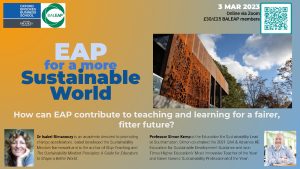
Sustainable Development Goal 4.7 highlights the pivotal role of education in driving the urgent changes needed for a more just and sustainable future.

Full information about the event [PDF]
All EAP leaders and practitioners hold a unique position to sketch out the conceptual ground for sustainability education, as they set the scene for academic study in HE. Staples of EAP expertise such as scaffolded learning, reflective practice, communicative and collaborative learning, critical thinking skills and student-centred pedagogies are also key to teaching and learning for sustainability.
This BALEAP PIM aims to build on these EAP strengths and share complementary knowledge, resources and networking potential to enable educators from multiple disciplinary backgrounds to embed transformative sustainability education into any course, at any level.
Come and join some of the leading experts in Education for Sustainable Development (ESD) driving ‘an educational change agenda allowing us to look critically at how the world is and to envision how it might be, supporting learners to create and pursue visions of a better world’ (Advance HE QAA ESD Guidance, 2021: p.8).
Professor Simon Kemp is an award-winning academic recognised for his student-focused work in ESD and employability through the Times Higher Education ‘Most Innovative Teacher of Year’, a National Teaching Fellowship, and the Green Gowns ‘Sustainability Professional of the Year’ awards. He is the University Lead in Education for Sustainable Development (ESD) at the University of Southampton and responsible for embedding sustainable development across the whole of the university curricula and student experience. He was Co-Chair for the 2021 Advance HE and QAA ESD Guidance document.
Dr Isabel Rimanoczy is an academic devoted to promoting change accelerators. She developed the Sustainability Mindset framework by studying business leaders who championed corporate initiatives with a positive impact on the environment and the community, and created the PRME Working Group on Sustainability Mindset, an international cohort of academics promoting a sustainability mindset with their students. She is the author of ten books, including Stop Teaching and The Sustainability Mindset Principles: A Guide for Educators to Shape a Better World.
Themes for the PIM are drawn from the UNESCO ESD Competency framework (2017) to prompt responses to Stephen Sterling’s critical question: ‘How should – and how can – education and learning be re-thought and re-configured to make a significant and central contribution to achieving a more sustainable and just world?’ The themes are intentionally broad, as the aim is to share good practice, develop ideas and inspire others – so select the strand best fitted to your proposal area.
Ways of thinking
Ways of practising
Ways of being
Note: Talks marked with an asterisk can be watched via the YouTube playlist embedded below.
Dr Isabel Rimanoczy: What is the Sustainability Mindset and why does it matter in Higher Education (PLENARY)*
David Nelson & Cathy d’Abreu: Appreciative Inquiry, the ESD Competency Workshop
Averil Bolster & Peter Levrai: Be the Change You Want to See. Ways of Practising for Teachers
Peter Buckley: Things to consider when Incorporating Sustainability into your Professional Practice *
Owain Llewellyn: A Framework for the Future. Embedding ESD in a Pathways College *
Lisa Hale: Learning to do. Collaborative Learning – EAP meets ESD
Jo Kukuczka: Evaluating Values *
Dana Wentworth & Muriel Cheval: Collaborative Online International Learning *
Alex Runchman & Michael Thornton: Embedding UN Sustainable Development goals into an EAP curriculum *
Asynchronous Artefacts – a Padlet with resources related to sustainability and EAP
(Sustainable!) ‘goodie bag’ – a Padlet with key resources and ideas for developing ESD teaching and learning